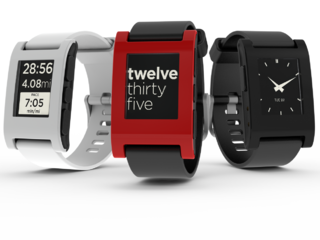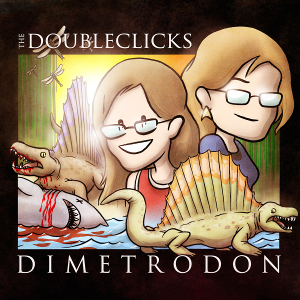
Kickstarter is an American public benefit corporation based in Brooklyn, New York, that maintains a global crowdfunding platform focused on creativity. The company's stated mission is to "help bring creative projects to life". As of February 2023, Kickstarter has received US$7 billion in pledges from 21.7 million backers to fund 233,626 projects, such as films, music, stage shows, comics, journalism, video games, board games, technology, publishing, and food-related projects.

Indiegogo is an American crowdfunding website founded in 2008 by Danae Ringelmann, Slava Rubin, and Eric Schell. Its headquarters are in San Francisco, California. The site is one of the first sites to offer crowd funding. Indiegogo allows people to solicit funds for an idea, charity, or start-up business. Indiegogo charges a 5% fee on contributions. This charge is in addition to Stripe credit card processing charges of 3% + $0.30 per transaction. Fifteen million people visit the site each month.

Pebble is a discontinued smartwatch developed by Pebble Technology Corporation. Funding was conducted through a Kickstarter campaign running from April 11, 2012, to May 18, 2012, which raised $10.3 million; it was the most funded project in Kickstarter history, at the time. Pebble began shipping watches to Kickstarter backers in January 2013. Pebble watches can be connected to Android and iOS devices to show notifications and messages. An online app store distributed Pebble-compatible apps from many developers including ESPN, Uber, Runkeeper, and GoPro.
Video game development has typically been funded by large publishing companies or are alternatively paid for mostly by the developers themselves as independent titles. Other funding may come from government incentives or from private funding.
Experiment, formerly called Microryza, is a US website for crowdfunding science-based research projects. Researchers can post their research projects to solicit pledges. Experiment works on the all-or-nothing funding model. The backers are only charged if the research projects reach their funding target during a set time frame. In February 2014, the site changed its name from Microryza to Experiment.com.

Lockitron is a device which can lock and unlock doors via remote control, typically via a smartphone. Starting with installations in 2010, it is one of the earliest examples of a Smart lock. Lockitron was made by Apigy Inc., a start-up based in Mountain View, California. Apigy was a graduate of the Y Combinator start-up accelerator.
Roman Mars is an American radio producer. He is the host and producer of 99% Invisible, a KALW radio show and podcast, and a founder of the podcast collective Radiotopia, which he describes as efforts "to broaden the radio landscape [and] make shows that aren't bound by conventions" of public radio in the United States.

Exploding Kittens is a casual dedicated deck card game designed by Matthew Inman of The Oatmeal webcomic, Elan Lee and Shane Small, and first published by The Oatmeal in 2015. Beginning as a Kickstarter project seeking US$10,000 in crowdfunding, it exceeded its goal in eight minutes.

Oregon Venture Fund makes venture investments in the Portland, Oregon area and throughout Oregon and SW Washington. The fund consists of 180 institutional and angel investors, of whom 85% have run or founded a business. The fund evaluates up to 300 business plans per year, selecting five to seven to invest in annually. In 2018, the fund changed its name from Oregon Angel Fund to Oregon Venture Fund and launched a new $30M fund. Since its inception, Oregon Venture Fund has generated an average annual rate of return of 34% and a return on investment exceeding $3.50 for each dollar invested.

Dimetrodon is the third album from the nerd-folk duo The Doubleclicks, released on June 10, 2014. The album was funded via Kickstarter with a goal of $18,000. The campaign exceeded this and raised $80,923, on February 18, 2014, making it the most successful Portland music Kickstarter to date.

Fig was a crowdfunding platform for video games. It launched in August 2015. Unlike traditional crowdfunding approaches like Kickstarter, where individuals can back a project to receive rewards, Fig used a mixed model that includes individual backing and the opportunity for uncredited investors to invest as to obtain a share of future revenues for successful projects. At the end of 2017, four projects had begun generating returns, returning 245% to Fig investors.

Harebrained Schemes, LLC is an American video game developer based in Seattle, Washington. It was co-founded in 2011 by Jordan Weisman and Mitch Gitelman. Prior to founding Harebrained Schemes, Weisman and Gitelman worked together on the MechCommander and Crimson Skies franchises at FASA, another company founded by Weisman. As of mid-2015, the studio had under 60 employees. The studio was acquired by Paradox Interactive in June 2018.
Crowdfunding is the practice of funding a project or venture by raising money from a large number of people, typically via the internet. Crowdfunding is a form of crowdsourcing and alternative finance. In 2015, over US$34 billion was raised worldwide by crowdfunding.
Bonaverde was a Berlin-based company known for developing a roast-grind-brew coffeemaker. Founded by Hans Stier in 2013, the company first received widespread notice for its highly successful crowdfunding. Despite significant controversy over its fund raising strategy and lack of communication with crowdfunding contributors, the product received recognition for its combination of coffee and Internet of Things technology, including a Dealerscope 2018 IMPACT Award

Piko Interactive LLC is an American video game publisher based in San Antonio, Texas. Founded in early 2013 by Eli Galindo, the company focuses on physical re-releases of games from older video game consoles and digitally released ports to newer systems.

Neptune Computer Inc., commonly known as Neptune, is a Canadian privately held consumer electronics and wearable technology company, founded in 2013 by Simon Tian in Montreal, Quebec, and currently based in Toronto. The company has raised around $7 million from private investors, and over $2 million from crowdfunding sources like Kickstarter and Indiegogo.
Crowd Supply is a crowdfunding platform based in Portland, Oregon. The platform has claimed "over twice the success rate of Kickstarter and Indiegogo", and partners with creators who use it, providing mentorship resembling a business incubator.
Bears vs Babies is a card game created by Elan Lee and Matthew Inman, who also created Exploding Kittens. Inman is also the founder of the website The Oatmeal.
The Zano was a failed Kickstarter project created by Torquing Group to create a remote-control quadcopter drone with a high-definition camera. After receiving over three million dollars from crowdfunding on Kickstarter, the team was unable to create a product that matched their original description, and eventually filed for bankruptcy after delivering around 600 partially functional drones. Noted as one of the first high-profile Kickstarter failures, the collapse of the Zano prompted Kickstarter to hire an investigative reporter to evaluate why the project failed.











